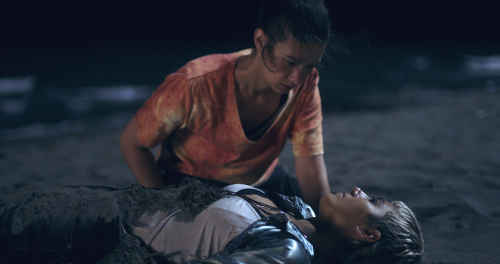
BFI Flare: London LGBTIQ+ Film Festival
MOVIE REVIEW
Wet Sand (2021)
The arrival of a city mouse into a country village is a tale as old as time, but the city mouse doesn’t usually wear a cigarette lighter on a cord down her cleavage. The village itself, on the edge of the Black Sea in Georgia, is not an easy place – the doctors and the police don’t always do their jobs properly; the men don’t always keep their fists to themselves; and the neighbors’ mouths don’t always stay shut. On the news it’s announced the national day against homophobia is now a day for families. But in the village the big news is that the elderly Eliko (Tengo Javakhadze) has killed himself, and the bigger question is what his granddaughter Moe (Bebe Sesitashvili) will do with his house after the funeral. But director Elene Naveriani, who cowrote the script with Sandro Naveriani, isn’t interested in how the dead bury the dead. This is an excellent movie about the tremendous difficulty of finding joy in a spiteful world and on how little an entire lifetime can be built.
Wet Sand is the name of the village café. During the day the old men play backgammon; at night everyone stops in for a drink. It belongs to Amnon (Gia Agumava), a quiet former sailor who’s owned it for 30 years without ever being fully accepted by the community. His waitress is Fleshka (Megi Kobaladze, an unusual beauty), a guarded young woman who likes Amnon and likes working for him, but nothing else in her life. It’s Amnon who meets Moe off the bus, and who helps her get situated in Eliko’s house. Later in the café, the women turn up their noses when Moe walks in with her jeans and short haircut, while the men are more directly rude, but that’s as far as they challenge her right to be there. It’s still pretty far; and Moe doesn’t take it lying down. Fleshka pours the drinks and watches. In the run up to the funeral, the nosiest neighbor, Neli (Eka Chavleishvili), tells Moe how close she was with Moe’s mother, but doesn’t know – and Moe doesn’t tell her – the mother has been dead for years. The handsome young policeman, Alex (Giorgi Tsereteli), offers Moe advice she doesn’t want. The weary fisherman, Spero (Kahka Kobaladze), comes in for his nightcap once the other villagers have gone. Fleshka pours the drinks and occasionally says her piece. And Moe starts to realize how much about her grandfather, and her own life, that she didn’t know.
Now, when a movie is shown as part of a festival such as BFI Flare: London LGBTQIA+ Film Festival, plot twists that might otherwise startle are obviously more obvious. But the movie is not about gayness being a surprise. It’s about the price of keeping things hidden. Moe would have had an entirely different life if her dead mother had done one single thing differently; and Amnon would have had a happy one if it wasn’t for one single mistake. These bitter revelations, revealed with an apt slowness that allows their meaning to be fully considered, are somehow eased by Fleshka’s caustic presence. After the death of her parents she inherited a house no one wants to buy, but even if she could afford to leave this village she hates, where would she go? It’s the only home she’s ever known. So it’s no wonder she’s drawn to Moe, whose comfort in her big-city life means she’s surprised to find herself out of her depth in the vicious village atmosphere, which Fleshka can navigate as easily as Spero his boat. But as one surprise gently unfurls, there’s also a second, more dangerous one, haunting Amnon like a ghost.
Mr. Agumava has the lived-in presence of a man who spent his youth living off his strength, but who is no longer young and therefore so very, very tired. His acceptance of and tolerance for pain is never milked for effect, which means it’s all the more effective to consider him as he sits, hands between his knees, and waits for something else to change. Ms. Sesitashvili’s look – costumes by Nino Injia – is the most modern thing in the village, and hipster enough for Brooklyn or East London. Moe’s annoyance with the necessities of death and her refusal to tolerate the village’s smallmindedness without ever leaching over into anger is a fascinating choice; and Ms. Sesitashvili’s sense of righteous calm is unusually appealing. But it’s Ms. Kobaladze who’s the sensation. Fleshka is both an outsider – younger and angrier – than the rest of the village while simultaneously being utterly one of them. Her sense of perspective, fondness for Amnon and willingness to get her hands dirty for something she believes is all the more extraordinary for the lack of fireworks in the performance.
Ms. Naveriani knows how people don’t waste their breath discussing something everyone knows, and how in a little village silence can be more important than words. She also knows how to find the unexpected beauty which prevents the movie from being grim; just look at Agnesh Pakozdi’s shot of the damaged mosaic at the bus stop, or how the little café is filmed in a way to make it seem colossal. Which it is, of course. It’s Amnon’s entire world. The denouement is still a bitter pill – one all the more believable if you know how quickly things can get out of hand between people who’ve known each other forever – but the finale is an enchanting twist of hope, and one which has been fully earned. It’s melancholy yet hopeful at the same time, and terrific from start to finish. It deserves much more attention than it’s gotten.
Comments